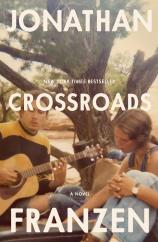Crossroads
Review
Crossroads
My review of Jonathan Franzen’s 2010 novel, FREEDOM, concluded with the observation that by the time the book ended, you would feel like you knew its main characters “as well as you know some of your closest friends. Maybe better.” I didn’t think it would be possible to experience that sensation more intensely, but that’s precisely how I feel after spending nearly 600 pages with the Hildebrandt family in Franzen’s accomplished sixth novel, CROSSROADS.
In much of his fiction, Franzen has revealed himself as a writer concerned primarily with the dynamics of family life, and that preoccupation reaches its apotheosis here. Set principally in the “affluent and mostly white” Chicago suburb of New Prospect two days before Christmas 1971, the book focuses on Russ Hildebrandt, associate minister of the First Reformed Church; his wife, Marion; and three of their four children --- Clem, Becky and Perry.
"As skillful as Franzen is in portraying the Hildebrandts’ present-day struggles, his talent fully emerges in two novella-length flashbacks that reveal the roots of Marion and Russ’ travails."
As the holiday looms, 45-year-old Russ languishes in the uninspired, low-paying ministry (his children refer to their church-provided housing as the “Crappier Parsonage”) where he has spent the past decade. Russ is still smarting three years later from the humiliation of his replacement by younger, hipper minister Rick Ambrose as head of the popular youth fellowship that provides the novel’s title. He’s obsessively contemplating an affair with one of his congregants, a widow in her mid-30s who’s part of a group that works with him in providing assistance to a Black church in the inner city. Marion, recognizing that she’s “become invisible to her husband” when it comes to sexual attraction, and understanding all too well that their marriage is foundering, attributes these developments mainly to the weight gain she’s determined to reverse through a regimen of crash dieting and cigarettes.
Safely ensconced at the University of Illinois and in a relationship that’s providing an intense sexual initiation, Clem decides to abandon his educational deferment in hopes he’ll be drafted to serve in Vietnam and show his pacifist father “what a strong man did.” Through her involvement in Crossroads and her attraction to one of its prominent members, a talented folk singer, high school senior Becky, who perceives herself as the “family truth-teller,” is undergoing a transformation from a girl obsessed with social status to experiencing her “first glimmering of spirituality.” Perry, a brilliant 15-year-old and small-time pot dealer, is sliding down a dangerous slope that’s complicated by incipient mental illness.
These characters, and a modest but memorable supporting cast, provide ample fodder for Franzen’s sturdily constructed story. While he foregrounds the senior Hildebrandts’ simmering angst in the days leading up to a holiday most of the family seems to despise, and in a later section the following Easter, he neatly balances it with the struggles of their three older children. His ability to dissect the Hildebrandts’ inner lives with patience and nuance is masterly. At the same time, he seasons the novel’s plot with sufficient conflict, both internal and external, to sustain its momentum, especially as the story builds toward the crisis that will engulf the family.
As skillful as Franzen is in portraying the Hildebrandts’ present-day struggles, his talent fully emerges in two novella-length flashbacks that reveal the roots of Marion and Russ’ travails. During a painful session with the psychiatrist she’s “paying to be her friend,” Marion recalls the interlude she spent as a 20-year-old in Los Angeles in 1940, when her vague dreams of an acting career crashed in spectacular fashion after her affair with a married man, eventually leading her to the Catholic Church. In Russ’ case, the memories dwell on his strict upbringing in a Mennonite community in Indiana, and of the time he spent in Arizona in alternative service as a conscientious objector during World War II, when he and Marion met and married in a match that clearly bore the seeds of its own undermining.
It would be misleadingly reductionist to describe CROSSROADS as a “religious” novel, but few contemporary works engage with the subjects of belief and skepticism, good and evil as thoughtfully and frankly as this one. In their markedly different spiritual crises, Russ, Marion, Clem and Becky all undergo moments of profound reflection that feel both particularistic in the context of the novel and universal.
Whether it’s Marion wondering if Russ’ church has erred in stressing Jesus’ ethical teachings over the concept of mortal sin, Becky pondering “God’s mysterious workings,” Russ confessing to his rival, Rick Ambrose, that “I’ve started hating God,” or atheist Clem expressing his loneliness at being the “nonbeliever among believers,” Franzen treats each of these perspectives with dignity and respect. The spirits of John Updike and Walker Percy seem to hover over this novel when it comes to these concerns.
CROSSROADS is the first of a projected trilogy, ambitiously titled --- with a nod to George Eliot’s MIDDLEMARCH --- “A Key to All Mythologies.” Whether Jonathan Franzen elects to dig more deeply into all the Hildebrandts’ lives or channel his story in a different direction, the others can’t come soon enough.
Reviewed by Harvey Freedenberg on October 22, 2021
Crossroads
- Publication Date: October 4, 2022
- Genres: Fiction
- Paperback: 592 pages
- Publisher: Picador
- ISBN-10: 1250858704
- ISBN-13: 9781250858702




